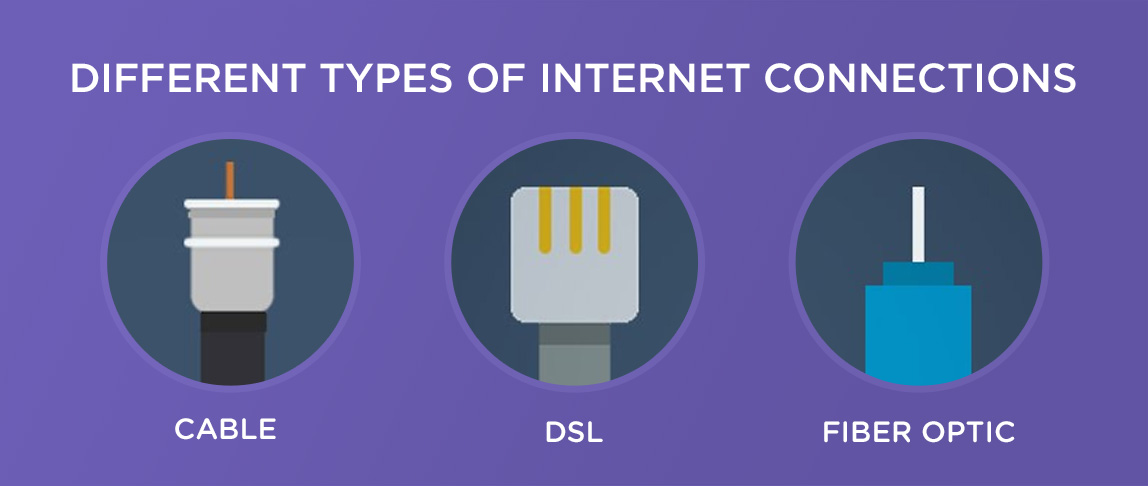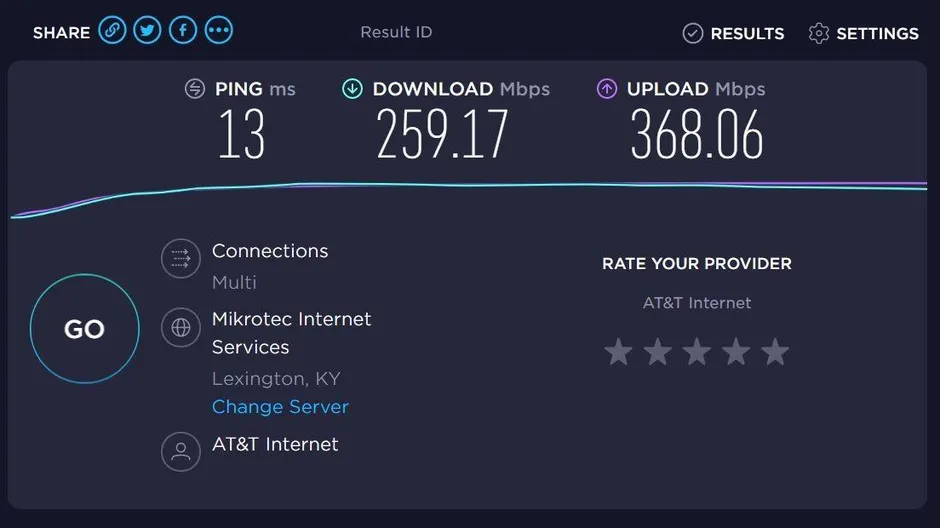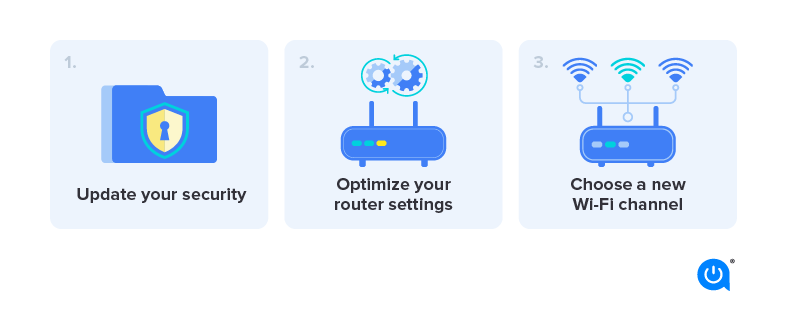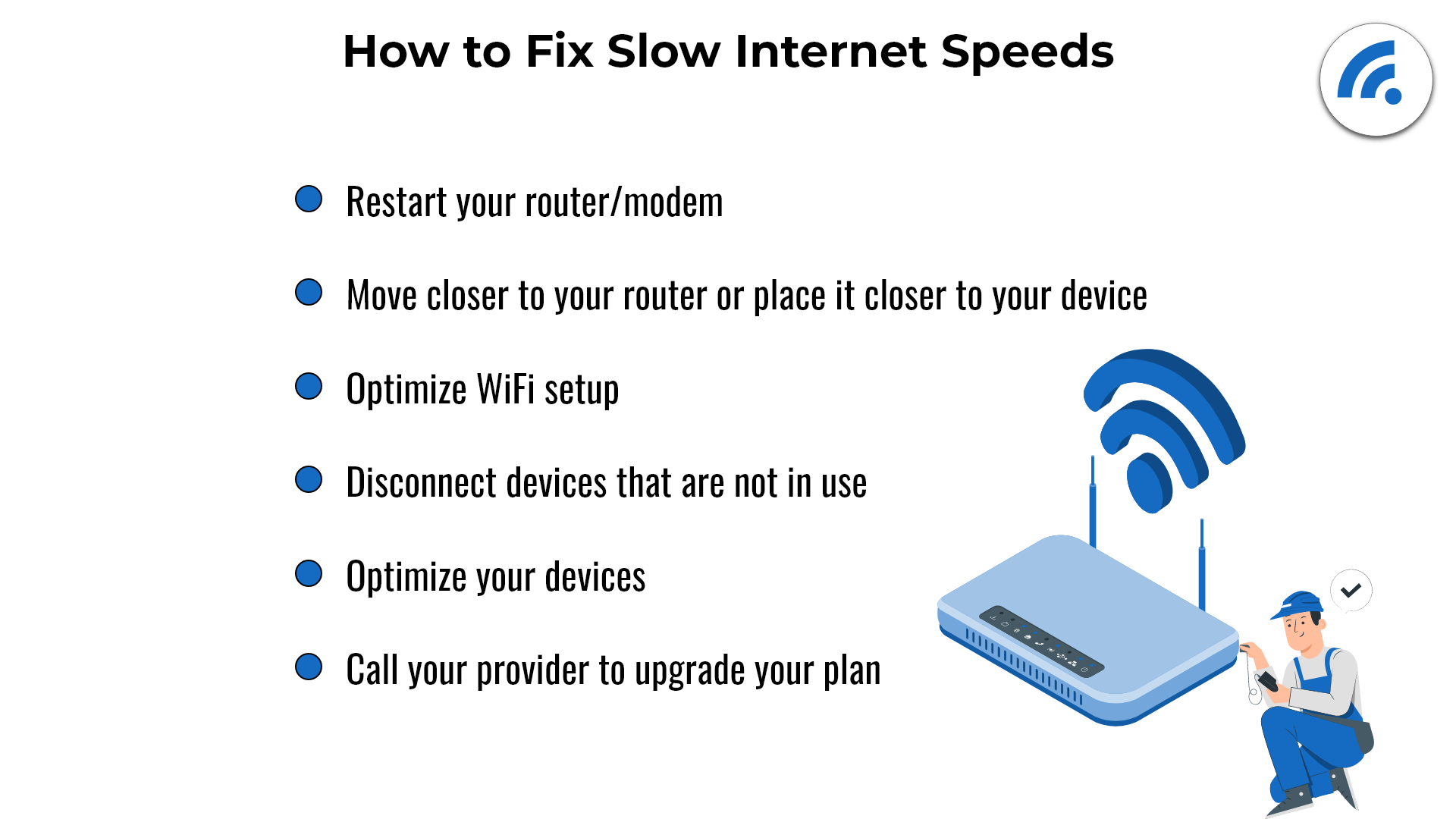Tech
What Is A Good Internet Speed? Factors To Consider When Choosing The Right Plan

What Is A Good Internet Speed? – In today’s fast-paced world, a dependable internet connection is necessary. A good internet connection is crucial, from streaming movies and TV shows to remote work and online gaming.
However, with numerous internet service providers (ISPs) offering various plans with different speeds and data caps, selecting the right one can be difficult.
This all-inclusive guide will cover what constitutes a good internet speed, factors to consider when choosing an internet plan, and tips for enhancing your internet speed.
What is Internet speed?
The velocity of data transmission between the internet and your device is known as internet speed, which is calculated in megabits per second (Mbps) or gigabits per second (Gbps).
The faster the speed, the quicker data can be uploaded or downloaded. To illustrate, a 100 Mbps connection allows you to download 100 megabits of data in a second.
Types of Internet Connections

DSL
Digital subscriber line (DSL) is a type of internet service that utilizes pre-existing telephone lines to provide connectivity.
This service is commonly available and typically offers up to 100 Mbps speeds. However, the quality and speed of the connection may differ based on your distance from the provider’s central office.
Cable
Coaxial cables are utilized by cable internet to provide internet services, which is more rapid than DSL and easily accessible in urban regions.
Nevertheless, the internet speed may decline during peak usage hours when numerous users are connected.
Fiber optic
Fiber-optic internet utilizes fiber-optic cables for transmitting data and is the most rapid and dependable form of internet connection, boasting speeds of up to 10 Gbps.
Nevertheless, it is not broadly accessible and could be more costly than other internet connections.
Satellite
Satellite internet relies on a satellite dish to facilitate data transmission to and from the internet.
This technology is particularly useful in remote locations where alternative internet connections are unavailable.
Nevertheless, it typically offers slower and more costly service than other internet options and may also be susceptible to disruptions caused by inclement weather conditions.
What Is A Good Internet Speed? – Factors To Consider When Choosing An Internet Plan

There are various factors to take into account when selecting an internet plan, such as:
Download and upload speeds
The rate at which data is transferred from the internet to your device is known as download speed, whereas the rate at which data is transferred from your device to the internet is referred to as upload speed.
It’s important to select a plan that provides download and upload speeds that are suitable for your requirements. You may need to consider a plan with higher download speeds if you frequently download large files or stream movies.
Data caps and usage
Certain internet service providers enforce data caps that restrict the quantity of data you can consume each month. Going over the data cap may result in additional fees or a reduction in internet speed.
Selecting a plan that corresponds to your data usage requirements is advisable.
If you regularly engage in activities such as streaming movies or playing online games, opting for a plan that provides unrestricted data usage may be necessary.
Latency and ping
Latency denotes the time lapse between transmitting and receiving data, typically quantified in milliseconds (ms), which can potentially impede the velocity and efficacy of your internet connectivity.
On the other hand, Ping gauges the latency duration it takes for a signal to traverse from your device to the server and vice versa. Selecting a plan with reduced latency and ping is advisable to optimize your internet performance.
Price and contract length
It’s important to take into account both the price and duration of the contract when selecting an internet plan.
While certain internet service providers (ISPs) may offer discounted rates for new customers, these rates could rise after the promotional period expires.
Moreover, some ISPs might mandate a lengthy contract that includes fees for early termination.
How To Test Your Internet Speed

Various online speed test tools are available to check your internet speed, including Speedtest by Ookla, Fast.com, and Google Fiber Speedtest.
These tools determine your download and upload speeds, as well as your ping and latency. For accurate results, it is advisable to perform the test multiple times at different times of the day and calculate the average speed.
Tips for optimizing your internet speed
Here are some tips for optimizing your internet speed:

Update your router firmware
It is important to ensure that your router firmware is kept up to date. The installation of new updates can potentially enhance both the security and performance of your router.
Reduce interference
Your internet speed can be hindered by the interference caused by other electronic devices. To avoid this, ensure your router is kept away from microwaves, cordless phones, and baby monitors.
Limit background downloads and uploads
Reducing the number of apps running in the background and turning off automatic updates can help prevent background downloads and uploads from slowing down your internet speed.
Use a wired connection
To ensure optimal speed and reliability, it is recommended that you use a wired connection instead of a wireless connection. To do this, connect your device to the router using an Ethernet cable.
Prioritize bandwidth
Certain routers provide the option to prioritize bandwidth for specific devices or applications. Optimize bandwidth for applications that demand higher speeds, such as online gaming or streaming.
Conclusion

Optimizing your internet experience begins with selecting the appropriate internet plan.
Before deciding, it is essential to consider various factors, such as download and upload speeds, data caps, latency, ping, price, and contract length.
Consistently test your internet speed and follow tips for enhancing your internet speed to attain optimal performance.
RELATED CTN NEWS:
OpenAI Introduces ChatGPT Plugins Support To Access More Recent Data
How To Become A UX Designer: Importance And Skills Required
What Is Natural Language Processing (NLP) And How Does It Work?
Tech
US: A Judge Mandates that Google Allow Competing App Stores to Access Android

(VOR News) – The ruling is that Google, the greatest technology firm in the world, is required to make its Android smartphone operating system available to merchants that supply applications that are in direct rivalry with Google’s. This decision was reached by a judge in the United States of America.
The Android Play store, which is owned and operated by Google, was found to be an example of an illegal monopoly arrangement by a jury in the state of California on Monday. The finding was reached by a jury. Monday is the day that this decision was come to.
An earlier federal judge ruled Google’s search engine illegal.
This finding, which came after that decision, has forced the company to suffer yet another setback. As a result of the corporation having already encountered its initial obstacle, this decision has been established. This particular decision was made by the judge during the month of August, when the month was in progress.
In light of the fact that the decision was made, what exactly does it mean that the choice was accepted?
In accordance with the verdict, Google is obligated to make it possible for users to download Android app stores that are offered by third-party competitors. For a period of three years, the corporation is prohibited from imposing restrictions on the usage of payment mechanisms that are integrated into the application.
In addition, it is important to keep in mind that Google does not possess the right to impose restrictions on the utilization of ways to make payments online.
Additionally, the verdict makes it unlawful for Google to give money to manufacturers of smartphones in order to preinstall its app store. Smartphone manufacturers are prohibited from doing so.
Furthermore, it prevents Google from the possibility of sharing the revenue that is generated by the Play store with other companies that are in the industry of delivering mobile applications.
In addition to this, the court has mandated the establishment of a technical committee that will be made up of three different people chosen at random.
The committee will be responsible for monitoring the implementation of the reforms and finding solutions to any disagreements that may occur as a consequence of the implementation of the reforms while they are being implemented. This task will fall under the committee’s purview so that it may fulfill its duties.
However, certain components were allowed to be put into action until July 1st, despite the fact that the judge’s statement suggested that the ruling would take effect on November 1st. The statement was the basis for the ruling, which ultimately became effective.
Particularly, I wanted to know what Google’s reaction would be.
There is a fact that Google does not adhere to this directive, which has been brought to their attention. This document argued that the alterations that the judge had ordered to be made would “cause a range of unintended consequences that will harm American consumers, developers, and device makers.”
The judge had ordered the modifications to be implemented. The alterations were to be carried out as indicated by the judge’s ruling. The judge made it clear that he expected these revisions to be carried out in accordance with his guidance.
The company’s regulatory affairs vice president, Lee-Anne Mulholland, provided the following statement: “We look forward to continuing to make our case on appeal, and we will continue to advocate for what is best for developers, device manufacturers, and the billions of Android users around the world.”
On average, over seventy percent of the total market for smartphones and other mobile devices is comprised of mobile devices that are powered by the Android operating system. Both smartphones and other small mobile devices are included in this category.
In the event that the Play app store continues to be shown on the home page and that other Google applications are pre-installed prior to the installation of the Android application, smartphone manufacturers are entitled to install the Android application at no cost at their discretion.
Additionally, the Android application can be installed on devices that are manufactured for smartphones.
SOURCE: DWN
SEE ALSO:
Over The Planned “Link Tax” Bill, Google Threatens to Remove NZ News Links.
Tech
WhatsApp Now Features a “Mention” Tool for Status Updates and Stories.

(VOR News) – Those who use WhatsApp now have the ability to mention other people in their stories or status updates as a consequence of a feature that was only recently enabled on the platform.
Previous to this point, this capability was not available. It wasn’t until quite recently that this capability became available to the public.
According to the information that was provided by the company, users now have the opportunity to tag close friends in their stories, and the person who is mentioned will have the option to go back and re-share an earlier version of that story. This information was provided by the company. The corporation was kind enough to reveal this information to us.
Because of a new feature that has been added to the WhatsApp app, users now have the opportunity to like individual stories and status updates.
This capability was previously unavailable to WhatsApp users.
A significant amount of progress has been made in this context. Alternative readers now have the chance to “like” a work, which is comparable to liking a post on Facebook. This feature was introduced in recent years. When compared to the past, this is a tremendous shift.
At one point in time, viewers were only permitted to observe the total number of views that a particular story had gotten. These restrictions were eliminated in later versions of the software.
Additionally, it is essential that the likes and reactions to a story be kept anonymous during the entire process. One of the factors that contributes to the general mystery that surrounds this characteristic is the fact that this is one of the elements.
The person who brought it to the attention of others is the only person who will be able to judge who enjoyed it and who did not care about it. These individuals will be able to make this determination.
A notification will be issued to the individual who was referenced earlier in the sentence and who was named in the story or status update that was discussed. A notification of this nature will be sent to the individual via WhatsApp.
This message will be sent to the user in question whenever that person makes a reference to another person while they are in the process of elaborating on a narrative or updating their status. You will receive a notification alerting you that you have been tagged in the narrative.
This notification will be delivered to the person who receives this message. In addition, students will be provided with the opportunity to re-share the tale for themselves.
It is important to note that if the names of individuals who have been referenced in a narrative or a status update are included in any of these, then the names of those individuals will not be accessible to any third party through any of these. In light of the fact that the identities of those individuals will be concealed from public disclosure, this is the condition that will be required.
While WhatsApp recently made the announcement that it will be incorporating this functionality, it is highly likely that not all users will have access to it at the same time.
This is despite the fact that WhatsApp recently made this announcement.
Despite the fact that WhatsApp has only recently made a public announcement that it will move forward with the deployment, this is the situation that has presented itself.
As soon as a short period of time has elapsed, access will be made available to each and every person on the entire world.
Additionally, WhatsApp has hinted that new functionalities might be introduced to the status and updates tab in the future months.
The purpose of these capabilities is to provide users with assistance in maintaining healthy connections with the individuals who play a vital role in their living experiences. This is done in order to give users with support in maintaining close relationships with the folks who are the subject of the inquiry.
It is with the purpose of supporting users in successfully keeping close ties with the individuals in question that this step is taken.
SOURCE: DN
SEE ALSO:
Over The Planned “Link Tax” Bill, Google Threatens to Remove NZ News Links.
Accenture and NVIDIA Collaborate to Enhance AI Implementation.
Tech
Over The Planned “Link Tax” Bill, Google Threatens to Remove NZ News Links.

(VOR News) – Google has sent a strong message to the New Zealand government, threatening to stop boosting local news content should the Fair Digital News Bargaining Bill become law.
The law, put up by the Labour government and backed by the coalition in power at the moment, mandates that digital companies such as Google pay back news organizations for links to their material.
News publishers, on the other hand, charge the tech giant with “corporate bullying.”
Google says this measure may have unanticipated effects.
Google New Zealand’s country director, Caroline Rainsford, voiced her worries that the law, which is being referred to as a “link tax,” is not doing enough to support the media industry in New Zealand right now.
She underlined that Google would have to make major adjustments if the previously mentioned law were to pass, including cutting off links to news articles from its Search, News, and Discover platforms and cutting off financial ties with regional publications.
According to Rainsford, similar legislation has been proposed and approved in other nations including Australia and Canada, but it has not been proven to be effective there and breaches the principles of the open web.
She drew attention to the fact that smaller media outlets will be most negatively impacted, which will limit their capacity to reach prospective audiences.
Google says its alternative options will protect smaller, local media from negative effects.
Conversely, it conveys apprehension regarding the possible fiscal obligations and vagueness of the legislation, which it feels generates an intolerable level of ambiguity for enterprises functioning within New Zealand.
The New Zealand News Publishers Association (NPA) has reacted to Google’s warnings by alleging that the internet behemoth is using coercive tactics.
They specifically contend that the need for regulation stems from the market distortion that Google and other tech giants have created, which has fueled their expansion into some of the most significant corporations in global history.
The legislation aims to create a more equal framework that media businesses can use to negotiate commercial relationships with technological platforms that profit from their content.
New Zealand Media Editors CEO Michael Boggs stated that he was in favor of the bill, citing the fact that Google now makes a substantial profit from material created by regional publications.
He also emphasized that the use of artificial intelligence by Google—which frequently makes references to news articles without giving credit to the original sources—highlights the significance of enacting legislation.
Paul Goldsmith, the Minister of Media and Communications, has stated that the government is now evaluating various viewpoints and is still in the consultation phase.
He stated that the government and Google have been having continuous talks and will keep up these ongoing discussions.
However, not all political parties accept the validity of the Act.
The ACT Party’s leader, David Seymour, has voiced his displeasure of the proposal, saying that Google is a game the government is “playing chicken” with. He threatened the smaller media companies, saying that they would suffer from worse search engine rankings if the internet giant followed through on its promises.
Seymour contended that it is not the government’s responsibility to shield companies from shifts in the market brought about by consumer preferences.
The things that have happened in other nations are similar to what has happened in New Zealand.
Google has agreements with a number of Australian media firms that are in compliance with its News Media Bargaining Code. These agreements contain provisions that permit an annual cancellation of these agreements.
Due to the government’s decision to exempt Google from the Online News Act, the company has committed to supporting news dissemination by contributing annually to the Canadian journalistic community.
The New Zealand measure is consistent with global approaches aimed at regulating the relationships that exist between technology corporations and media organizations.
It’s hard to say what will happen with the Fair Digital News Bargaining Bill as the discussion goes on. Google and the New Zealand media landscape are preparing for what might be a protracted legal battle.
SOURCE: TET
SEE ALSO:
Accenture and NVIDIA Collaborate to Enhance AI Implementation.
-

 News3 years ago
News3 years agoLet’s Know About Ultra High Net Worth Individual
-
Entertainment2 years ago
Mabelle Prior: The Voice of Hope, Resilience, and Diversity Inspiring Generations
-

 Health3 years ago
Health3 years agoHow Much Ivermectin Should You Take?
-

 Tech2 years ago
Tech2 years agoTop Forex Brokers of 2023: Reviews and Analysis for Successful Trading
-

 Lifestyles2 years ago
Lifestyles2 years agoAries Soulmate Signs
-

 Movies2 years ago
Movies2 years agoWhat Should I Do If Disney Plus Keeps Logging Me Out of TV?
-

 Health3 years ago
Health3 years agoCan I Buy Ivermectin Without A Prescription in the USA?
-

 Learning2 years ago
Learning2 years agoVirtual Numbers: What Are They For?
